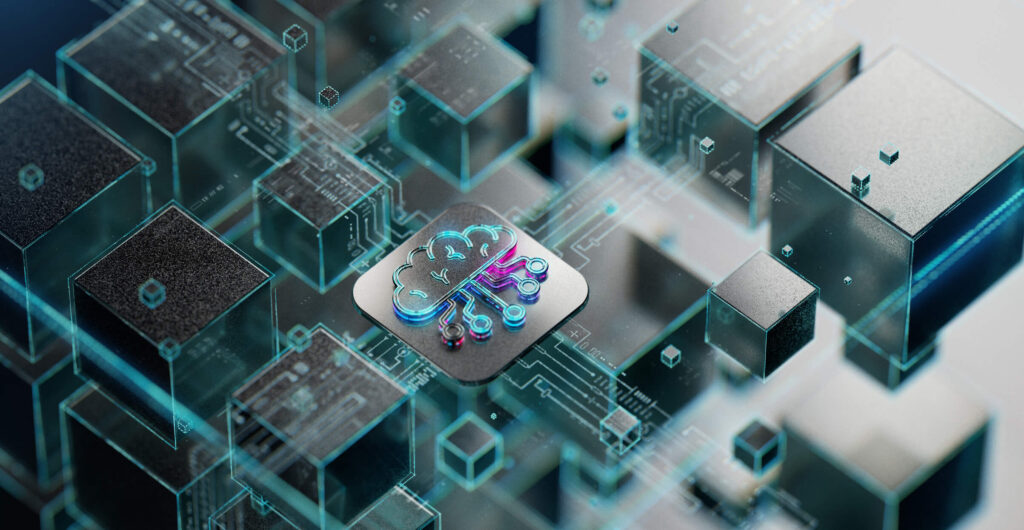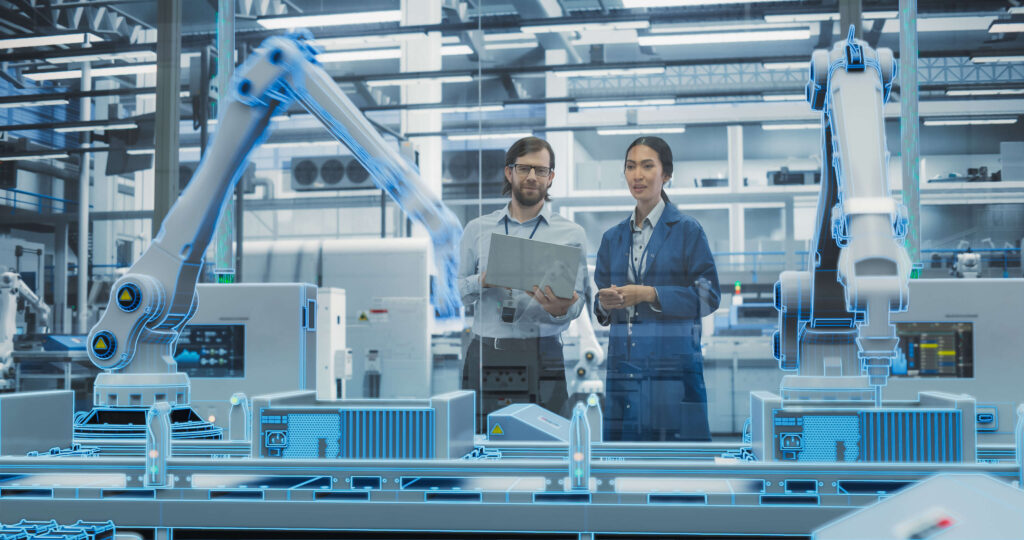Technological developments are currently disrupting work environments and influencing the nature of careers in diverse fields such as biotechnology, data science, cybersecurity, software development, and engineering. In addition to transforming workflows, advances in AI, quantum computing, and green technologies are also driving demand for specialized profiles. For professionals ready to face the world of work of tomorrow, this rapidly changing landscape presents a wealth of opportunities.
Table of Contents
- Cutting-edge generative AI and machine learning
- Sustainable technologies and ecological innovations
- Autonomous systems
- Quantum computing
- Extended Reality (XR)
- 5G and edge computing architecture
- Innovations in biotechnology and health
- Evolution of blockchain technology
- Digital twins and simulation technology
- Deep tech and spatial computing
- Embracing the future of new technologies
Are you ready to explore new careers and enter the world of spatial computing, autonomous systems, or generative AI? Let’s take a closer look at the technologies transforming the world of work and the careers they create.
Cutting-edge generative AI and machine learning

Generative AI, also known as GenAI, is revolutionizing several industries, including content creation, design, and healthcare. Using cutting-edge machine learning algorithms, artificial intelligence is opening up new possibilities and improving efficiency. AI is transforming what was previously unthinkable, from creating elaborate works of art to writing sophisticated programming code to making medical diagnoses—all with unprecedented levels of accuracy.
In our article, ” Can AI Overtake Human Intelligence? “, we take a closer look at the remarkable advances in AI technology and explore its potential to revolutionize our professional and personal lives.
Main applications : personalized teaching tools, AI-assisted design, and automated coding systems.
Profiles sought : generative AI specialists, machine learning engineers, and prompt engineers (query writers).
Sustainable technologies and ecological innovations
The development of more virtuous technologies such as carbon capture systems, green clouds, and energy-efficient cloud computing has become necessary amid global pressure for greater sustainability . Additionally, a growing number of sectors, including construction and manufacturing, are investing in sustainable materials and green packaging . The electronics sector is also adopting greener and more energy-efficient practices as more and more companies take action to reduce their carbon footprint and environmental impact.
By reducing emissions, optimizing resource use and facilitating real-time maintenance and monitoring, these technologies help companies achieve their environmental objectives while increasing their productivity and resilience.
Main applications : renewable energy networks , carbon footprint analysis and sustainable manufacturing practices.
Profiles sought : sustainable development engineers, green IT consultants and environmental data analysts.
Autonomous systems

Autonomous systems are changing the game in manufacturing, logistics, and transportation, from drones to self-driving cars to fully automated factories. By reducing human error and simplifying complex processes, these technologies can increase productivity, improve safety, and reduce operating costs. For example, the food industry is particularly benefiting from automated solutions , including robotic assembly lines, streamlined food production, and safer food products, thanks to the use of AI.
Smart distribution networks, precision agriculture , and flexible supply chains are just a few examples illustrating the new opportunities created by increasingly sophisticated automated systems.
Main applications : smart warehouses, autonomous delivery networks, and precision agriculture.
Profiles sought : robotics engineers, AI operations managers, and drone pilots.
Quantum computing
Quantum computing will soon revolutionize businesses worldwide. Quantum computing is transforming industries such as cutting-edge medical discovery, cryptography, and logistics optimization thanks to its unprecedented ability to process colossal volumes of data at extremely high speeds. This discovery could spur innovation in various industries by solving problems previously intractable using conventional computing.
According to Honeywell , quantum computing will help us solve a variety of problems in different industries, including machine learning, simulation, and optimization. Honeywell is looking at specific industries that will likely be impacted by quantum computing, including aerospace, chemicals, healthcare, pharmaceuticals, logistics, robotics, and finance.
Main applications : supply chain optimization, pharmaceutical product development, and cybersecurity improvement.
Job seekers : quantum software developers, quantum physics researchers, and cryptography specialists.
Extended Reality (XR)
By enabling the creation of immersive and interactive experiences, augmented reality (AR), virtual reality (VR), and mixed reality (MR)—collectively referred to as extended reality (XR)—are disrupting several industries, including entertainment, healthcare, and security. By 2025, these technologies will play a crucial role in improving customer interactions, optimizing remote collaboration, and changing job training . Extended reality will enable businesses to create innovative products, upskill employees through realistic simulations, and create captivating, personalized customer experiences through hardware and software developments.
Main applications : immersive learning environments, virtual product showrooms, and remote surgery.
Profiles sought : extended reality content creators, interaction designers, and virtual environment architects.
5G and edge computing architecture
The widespread deployment of 5G networks and the emergence of edge computing are transforming real-time data processing by bringing it closer to devices. In addition to reducing latency and improving performance, this powerful combination is accelerating advances in the Internet of Things (IoT), enabling the development of more efficient autonomous vehicles and supporting the creation of efficient smart city infrastructures. For example, in Switzerland, cities are at the forefront of technological developments , investing in smart parking solutions, LoRaWAN communication technology, and the IoT.
Main applications : connected medical devices, real-time industrial automation solutions, and urban traffic management.
Profiles sought : edge computing developers, IoT specialists, and network architects.
Innovations in biotechnology and health

The healthcare industry is entering a new era. Currently, AI is enabling medical professionals to better understand their patients’ health and even save lives . Personalized medicine and preventative healthcare are becoming the norm.
Check out our list of the 10 must-see healthcare technology trends and discover the technologies that will likely have the biggest impact on the future of the industry.
Main applications : genome editing, AI-powered medical diagnostics, and digital therapeutics.
Profiles sought : biotechnology researchers, health data analysts, and digital health consultants.
Evolution of blockchain technology
Blockchain technology extends far beyond the realm of cryptocurrencies and finds other revolutionary applications such as digital identity verification, supply chain management, and secure data exchange. Thanks to its decentralized structure, blockchain ensures greater transparency, increased security, and operational efficiency. As one of the cornerstones of the future of secure digital interactions, this technology enables real-time tracking, protection of personal identities against fraud, and reliable data exchange across all industries.
Main applications : Decentralized Finance (DeFi), and digital identity verification.
Profiles sought : Blockchain developers, DeFi verifiers, and DeFi strategy specialists.
Digital twins and simulation technology
By creating virtual replicas of physical systems, digital twin technology offers powerful real-time simulation and monitoring capabilities. By integrating sensor data and the Internet of Things, these digital replicas facilitate the optimization of design, testing, and operational procedures.
By modeling patient responses to treatments, they enable the development of personalized medicine. In manufacturing, digital twins help optimize predictive maintenance and product development. They improve sustainability and infrastructure management in urban development.
Main applications : smart factory simulations, urban infrastructure planning, and medical device prototyping.
Desired profiles : digital twin engineers, simulation technology developers, and specialists in industrial IoT applications.
Deep tech and spatial computing

Advances in deep tech and spatial computing are reshaping industries by merging the physical and digital worlds. Deep tech innovations, including AI, quantum computing, and advanced robotics, are enabling major advances in problem solving and complex systems.
Spatial computing leverages the previously mentioned AR, VR, and MR realities to create interactive and immersive environments, transforming the way we work, learn, and interact with data. According to the World Economic Forum , the ability to overlay digital elements on the physical world makes spatial computing the next big technological advancement.
Main applications: AI-powered robotics, AR/VR training platforms, and quantum computing solutions.
Profiles sought: deep tech engineers, spatial computing developers, and AR/VR content creators.
Embracing the future of new technologies
The rapid pace of technological advancements means that adaptability and continuous learning are more important than ever. To stay ahead of the curve, professionals must focus their efforts on developing skills in AI, cybersecurity, data analytics, and sustainable technology solutions.
By embracing these trends, both individuals and businesses can thrive in this time of unprecedented innovation and opportunity.


